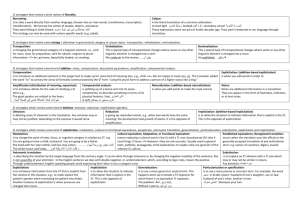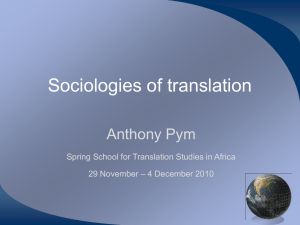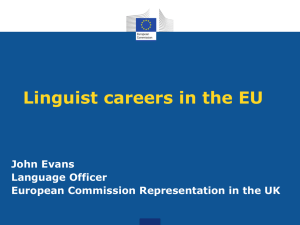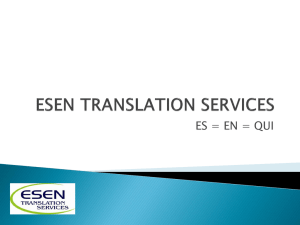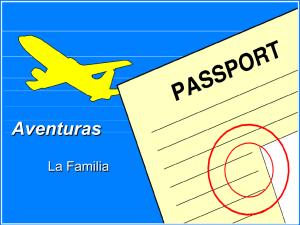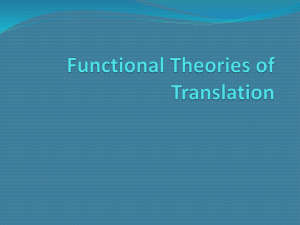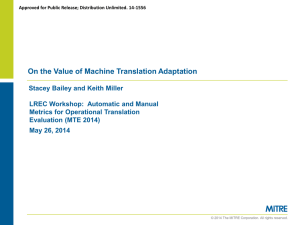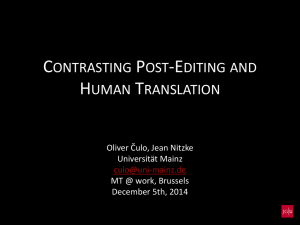Explicitation
advertisement
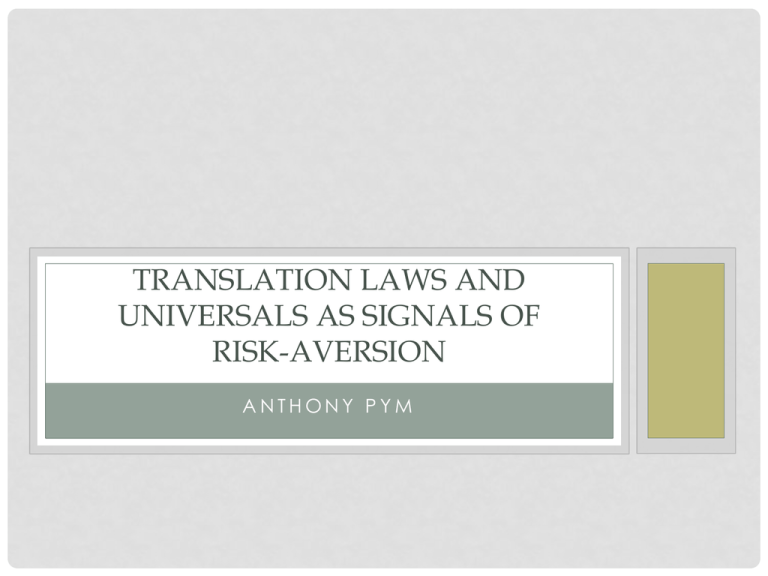
TRANSLATION LAWS AND UNIVERSALS AS SIGNALS OF RISK-AVERSION ANTHONY PYM BEHAVIORAL TENDENCIES • Levý, Jiří. 1963/2011. Umění překladu: “it is the psychology inherent in the activity of translating that is behind the tendency for translators themselves to opt for generalisation, neutralisation and repetition [as opposed to variation].” SOME TENDENCIES • Simplification: “the process and/or result of making do with less [different] words” (Blum-Kulka and Levenston 1983) • Explicitation: making implicit information explicit (Blum-Kulka 1986) • Equalizing: avoidance of extremes of language use (Shlesinger 1989) • Unique items: items only found in the target language tend not to be used (Tirkkonen-Condit 2004) SOME LAWS • Standardization: “conversion of textemes into repertoremes” (Toury 1995/2012) • Interference: “The greater the text unit (phrase, sentence, paragraph, chapter), the greater the interference.” (Toury 1995/2012) PROBLEMS WITH CORPORA • All units are presumed to have the same value. • Few probabilistic statistics are in sight. • No modeling can be made of translation processes (especially effort). • No causes can be identified. CAUSES FOR TENDENCIES? • Vinay and Darbelnet (1958): “prudence but also ignorance” • Levý (1963): “communication” vs. “aesthetic function” • Popovič (1975): “commercialization” vs. “quality” • Chesterman (2004): “translators are also readers” • Davidson (1973) “charity” or “rational accommodation” • Quine (1990, 1995) “empathy” RATIONAL RISK ANALYSIS • Manage risk of communicative failure (when there a no mutual benefits for partners) • Some items are high-risk, others are low-risk. • Work hard on high-risk items (i.e. reduce risk) • Do not work hard on low-risk items (i.e. accept risk) • Blame someone else when high-risk items are not worth the effort (i.e. transfer risk) • Run high risk? A SIMPLE TRANSLATION PROBLEM A SIMPLE TRANSLATION PROBLEM • Ting Ting Maggie Hui, RISK MANAGEMENT BY TRAINEE TRANSLATORS: A STUDY OF TRANSLATION PROCEDURES AND JUSTIFICATIONS IN PEER-GROUP INTERACTION (2012) “SHOP FEARLESSLY” “SHOP FEARLESSLY” No. Solution 1 购物愉快! (during the process) 享受这个旅程! (during the process) 祝您购物愉快哦! (during the process) 2 3 4 Literal backtranslation Happy shopping! Adaptation Risk management R- Enjoy your tour! Substitution R- Explicitation R- Substitution R- Wish you happiness when you do the shopping! 享受你在该店的“旅程” 。 Enjoy your “tour” (in final TT) in the shop. Procedure “SHOP FEARLESSLY” C4: Hmm… hmmm… “(ST) Enjoy your adventure” 呢? C7: “(ST) Enjoy your adventure”, “愛 你的冒險”, haha… C4: “冒險” 不好…… 不要 “冒險”, 但 是說…… C7: 這是說, 你來第一次你會享受…… 對, 第一次來你會享受…… 只要來一次 你會想享受這裡面…… C4: 對呀對呀! 因為他有點敢著說…... 來到一個…... 一個地方, 然後你…… 你 享受可以找到很多東西…… 所以這個 要翻成…… “好好享受你的新發現吧!” C7: Hmm, 挺好的! C4: Hmm… hmmm… “(ST) Enjoy your adventure”? C7: “(ST) Enjoy your adventure”, “Love your adventure”, haha… C4: “Adventure” is not good… Not to say “adventure”, how about… C7: So it means: When you come the first time you enjoy… right, when you come the first time you enjoy… just come once and you enjoy being here… C4: Right, right! Because it seems to say… come to a… a place, then you… you enjoy making many discoveries… so it can be translated as… “Enjoy the discoveries you make!” C7: Hmm, sounds good! “SHOP FEARLESSLY” No. Solution 1 爱你的冒险 2 Literal backProcedure translation Love your adventure Literalism 好好享受你的新发 Enjoy the discoveries 现 you make Shift of focus Risk management R -> ST R- “GET HUNGRY, SHOP FEARLESSLY” No. Solution 1 感到饿,就大胆 的…… 感到饿,就行动 吧! 2 Literal backtranslation Get hungry, audaciously… Get hungry, act now! Procedure Risk management Exaggeration R+ Omission R- “FEARLESS” TRANSLATOR’S RISK PROFILE SOME TENDENCIES • Simplification: “the process and/or result of making do with less [different] words” (Blum-Kulka and Levenston 1983) • Explicitation: making implicit information explicit (Blum-Kulka 1986) • Equalizing: avoidance of extremes of language use (Shlesinger 1989) • Unique items: items only found in the target language tend not to be used (Tirkkonen-Condit 2004) SOME LAWS • Standardization: “conversion of textemes into repertoremes” (Toury 1995/2012) • Interference: “The greater the text unit (phrase, sentence, paragraph, chapter), the greater the interference.” (Toury 1995/2012) AN EXPLANATION With no equivalence With no fidelity With no essentialist Skopos or purpose With no assumption of “complete information” (Levý) • With no more than a subject who estimates probable efforts and probable effects. • • • • A UNIVERSAL REWARD STRUCTURE? • “Authors always get the praise for what is good in a translation, and translators just get the blame for what is wrong” (Leonardo Bruni 1405)
